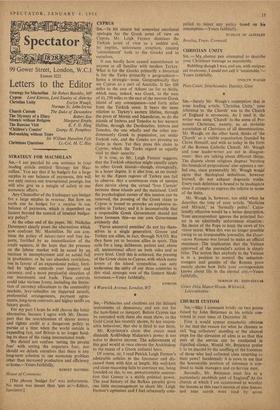Letters to the Editor
Strategy for Macmillan Sir Robert Boothby, MP Cyprus Lord Kinross, Lord Stanley of Alderley Christian Unity Evelyn Waugh, Norman St. John-Stevas Church Custom The Duke of Devonshire The Mystery of a Diary Robert Kee Morals without Religion Margaret Knight The Russian Visit E. F. G. Haig `Children's Comics' George H. Pumphrey Bed-making without Tears Sir William Hamilton Fyfe Christmas Questions Lt.-Col. M. C. Hay STRATEGY FOR MACMILLAN SIR,—I am puzzled by one sentence in your leading article entitled 'Strategy for Mac- millan.' You say that if he budgets for a large surplus in our balance of payments, this will not only restore our international prestige, but will also give us a margin of safety in our economic affairs.
AnyChancellor of the Exchequer can budget for a large surplus in revenue. But bow on earth can he budget for a surplus in our balance of payments, which is dependent on factors beyond the control of internal budget- ary policy?
At the other end of the paper, Mr. Nicholas Davenport clearly poses the alternatives which now confront Mr. Macmillan. He can con- tinue the policy of laissez-faire and free im- ports, fortified by an intensification of the credit squeeze, in the hope that the pressure on the labour market will be cased by an increase in unemployment and an actual fall in production; or he can abandon restriction- ism in favour of an expansionist policy, forti- fied by tighter controls over imports and currency, and a more purpbseful direction of our investment and trade. These controls could take various forms, including the limita- tion of currency allocations to the commodity markets, levy-subsidics on imported cereals, preferential arrangements, payment agree- ments, long-term contracts and higher tariffs on luxury goods.
For my part I hope he will choose the latter alternative, because I agree with Mr. Daven- port that the restrictionism of dearer money and tighter credit is a dangerous policy to pursue at a time when the world outside is expanding fast, and Britain is no longer hold- ing its share of the rising international trade.
We should not confuse 'setting the people free' with setting the importers free; nor should we delude ourselves that there is any long-term solution to our economic problem other than increased production and efficiency at home.—Yours faithfully, [The phrase 'budget for' was unfortunate. No more was meant than 'aim at.'—Editor, Spectator.]


































 Previous page
Previous page